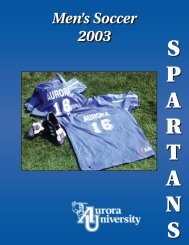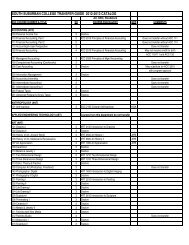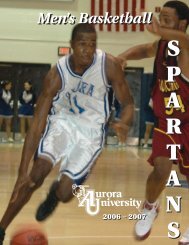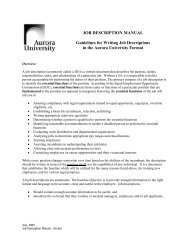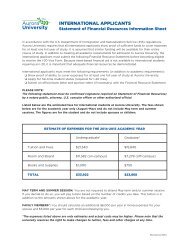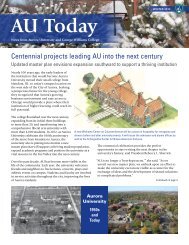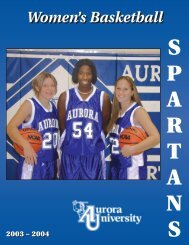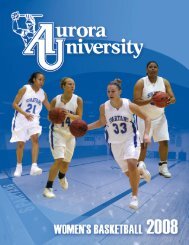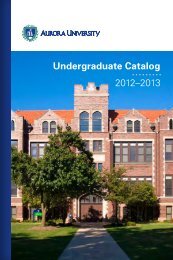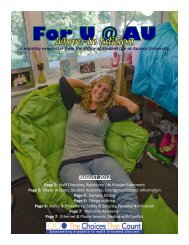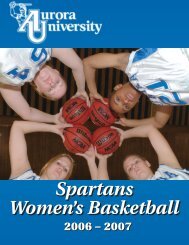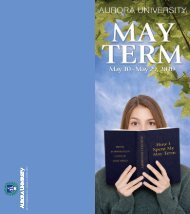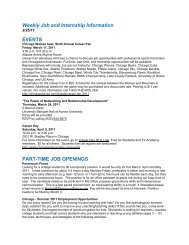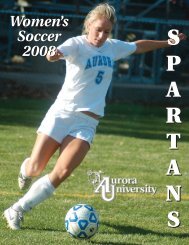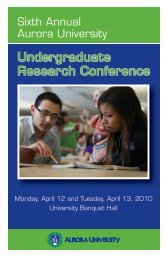Field Syllabus 2009-2010 - Aurora University
Field Syllabus 2009-2010 - Aurora University
Field Syllabus 2009-2010 - Aurora University
Create successful ePaper yourself
Turn your PDF publications into a flip-book with our unique Google optimized e-Paper software.
SYLLABUS<br />
FIELD INSTRUCTION<br />
BSW: SWK 4210-4220<br />
MSW: SWK 6730-6740<br />
SWK 6750-6760<br />
<strong>Aurora</strong> <strong>University</strong><br />
Director of <strong>Field</strong> Instruction: Alison Arendt, MSW<br />
School of Social Work Office Phone: 630-844-5423 Fax: 630-844-4923<br />
E-mail: aarendt@aurora.edu<br />
Office Hours: Monday – Friday 9A-5P<br />
I. TEXTS AND REQUIRED READINGS<br />
School of Social Work: <strong>Field</strong> Instruction Manual BSW and MSW Program,<br />
<strong>Aurora</strong> <strong>University</strong>. (Located on <strong>Aurora</strong> <strong>University</strong> School of Social Work<br />
Website)<br />
Baird, Brian N., (2008) The internship, practicum, and field placement<br />
Handbook: A guide for the helping professions (5 th ed). Upper Saddle<br />
River, New Jersey: Prentice Hall.<br />
Some agencies may have required readings as an expectation for interns.<br />
Students are encouraged to take responsibility to read agency manuals in order to<br />
have a working knowledge of the particular agency.<br />
II.<br />
INTRODUCTION AND OVERVIEW<br />
<strong>Field</strong> work is a composite of the entire Social Work curriculum. In contrast to the<br />
classroom method, it is a laboratory experience. It provides the opportunity for<br />
the student to translate knowledge and values into practice competency.<br />
Learning experiences in the field setting are under the instruction of an MSW<br />
with at least two years experience. Experiences include direct work with<br />
individuals, groups, families, and communities, as well as participation in staff<br />
activities.<br />
The beginning level field work is a minimum total of 450 hours. This is<br />
approximately fifteen (15) hours per week Advanced field work is a minimum<br />
total of 600 hours or approximately twenty hours (20) a week in field<br />
assignments.<br />
BSW:<br />
BSW field work consists of a minimum total of 450 hours over the full academic<br />
year (Fall and Spring semesters). This is approximately 15 hours per week.<br />
Students completing a CADC internship must complete a total of 500 hours.
Generalist Practice I and II, are co-requisite courses for <strong>Field</strong> Instruction I and II.<br />
Students must register for the General Practice courses and <strong>Field</strong> Instruction<br />
concurrently. Classroom assignments in the generalist practice course are<br />
designed to integrate the classroom and field learning experiences.<br />
MSW (First Placement/Year):<br />
<strong>Field</strong> work consists of a minimum total of 450 hours over the full academic year<br />
Fall and Spring semesters). This is approximately 15 hours per week. Students<br />
completing a CADC internship must complete 500 total field hours. Summer<br />
Block Placements will average 38 hours weekly from May until the end of the<br />
Summer term.<br />
Social Work Practice I and II are co-requisite courses for <strong>Field</strong> Instruction I and<br />
II. Students must register for the Social Work Practice courses and <strong>Field</strong><br />
Instruction concurrently. Classroom assignments in the social work practice<br />
courses are designed to integrate the classroom and field learning experiences.<br />
MSW (Second Placement/Year):<br />
<strong>Field</strong> work consists of a minimum total 600 hours over the full academic year (fall<br />
and spring semesters). This is approximately 20 hours per week.<br />
Advanced Social Work – Micro and Advanced Social Work – Macro courses are<br />
co-requisite courses for <strong>Field</strong> Instruction III and IV. Students must register for<br />
the Social Work Micro and Macro courses and <strong>Field</strong> Instruction concurrently.<br />
Classroom assignments in the social work micro and macro courses are designed<br />
to integrate the classroom and field learning experiences.<br />
III.<br />
COURSE OBJECTIVES<br />
As a result of successfully completing the <strong>Field</strong> Instruction course sequence<br />
students will be able to:<br />
Foundation Objective #1 Applies critical thinking skills within the context of<br />
professional social work practice.<br />
(EPAS Curriculum 4.0, 4.1, 4.2, 4.3, 4.4, 4.5, 4.6)<br />
Foundation Objective #2 Understands the value base of the profession and<br />
its ethical standards and principles, and practices accordingly.<br />
(EPAS Curriculum 4.0)<br />
Foundation Objective #3 Practices without discrimination and with respect,<br />
knowledge, and skills related to clients’ age, class, color, culture, disability,<br />
ethnicity, family structure, gender, marital status, national origin, race,<br />
religion, sex and sexual orientation.<br />
(EPAS Curriculum 4.0, 4.1, 4.2, 4.3, 4.4, 4.5, 4.6, 4.7)<br />
2
Foundation Objective #4 Understands the forms and mechanisms of<br />
oppression and discrimination and applies strategies of advocacy and social<br />
change that advance social and economic justice.<br />
(EPAS Curriculum 4.0, 4.1, 4.2, 4.3, 4.4)<br />
Foundation Objective #5 Understands and interprets the history of the social<br />
work profession and its contemporary structures and issues. (EPAS<br />
Currriculum 4.5)<br />
Foundation Objective #6 Applies the knowledge and skills of generalist social<br />
work practice (of a generalist social work perspective) with systems of all<br />
sizes. (EPAS Curriculum 4.0, 4.1, 4.2, 4.3, 4.4, 4.5, 4.7)<br />
Foundation Objective #7 Uses theoretical frameworks supported by<br />
empirical evidence to understand individual development and behavior<br />
across the life span and the interactions among individuals and between<br />
individuals and families, groups, organizations and communities. EPAS<br />
Curriculum 4.2, 4.3, 4.5, 4.7)<br />
Foundation Objective #8 Analyzes, formulates and influences social policy.<br />
EPAS Curriculum 4.3, 4.4, 4.7)<br />
Foundation Objective #9 Evaluates research studies, applies research<br />
findings to practice, and evaluates his or her own practice interventions.<br />
EPAS Curriculum 4.6, 4.7)<br />
Foundation Objective #10 Uses communication skills differently across client<br />
populations, colleagues, and communities. (EPAS Curriculum 4.5, 4.7)<br />
Foundation Objective #11 Uses supervision and consultation appropriate to<br />
social work practice. (EPAS Curriculum 4.5, 4.7)<br />
Foundation Objective #12 Functions within the structure of the organizations<br />
and service delivery systems and seeks necessary organizational change.<br />
(EPAS Curriculum 4.4, 4.5, 4.7)<br />
Concentration Objectives are to be measured in students enrolled in SWK 6750<br />
and SWK 6760, in their advanced MSW academic year.<br />
Concentration Objective #1 Applies advanced clinical social work knowledge<br />
and skills from the clinical concentration to work with diverse populations,<br />
emphasizing their inherent strengths and coping resilience.<br />
Concentration Objective #2 Demonstrates ability to advance the quality of<br />
their work, and their commitment to the larger social work profession.<br />
3
Concentration Objective #3 Articulates the program’s conception of<br />
advanced practice, including theories, practice skills, policy and research<br />
principles.<br />
Concentration Objective #4 Effectively provides clinical social work services<br />
to a variety of client populations.<br />
Concentration Objective #5 Demonstrates an advanced understanding of<br />
research designs and methods through practical application.<br />
IV.<br />
TEACHING METHOD/CLASS FORMAT<br />
<strong>Field</strong> Instruction placements and field learning experiences are selected and<br />
organized on an individual basis for each student to achieve these learning<br />
objectives. Teaching is adapted to individual student needs and the different<br />
learning opportunities available in a specific agency. The Director of <strong>Field</strong><br />
Instruction, after considering all of the factors of student needs and agency<br />
capability, approves the agency and the field instructor. The student’s interests<br />
are solicited and are considered in this process, however, all placements must be<br />
coordinated and approved by the Director of <strong>Field</strong> Instruction. The agency<br />
selection process, the assignment of students, and development of individualized<br />
learning agreements are described in the <strong>Field</strong> Instruction Manual.<br />
V. CLASS ASSIGNMENTS AND GRADING PROCEDURES<br />
A. During the first month of each placement the field instructor and student are<br />
expected to establish a written learning agreement, using the form entitled,<br />
“Student <strong>Field</strong> Instructor Learning Agreement.” In this document the <strong>Field</strong><br />
Instructor and student agree on specific learning objectives, decide on<br />
assignments to accomplish those objectives, and work out the various scheduling,<br />
supervisory, and evaluation arrangements to be used. Adjunct Faculty <strong>Field</strong><br />
Liaison will meet with the field student and field instructor at the internship site<br />
each semester. The student’s learning experiences will be reviewed and monitored<br />
by the <strong>Field</strong> Liaison.<br />
B. BSW and MSW beginning level internships aim to provide the student with<br />
opportunities to master generalist practice skills with a time-limited and problem<br />
solving nature. This internship will also allow the student to develop a beginning<br />
professional identity. Learning opportunities should include assignments with<br />
individuals, families and at least one group as well as some community issue or<br />
project in which the student will be involved in as an observer-participant. In<br />
addition, students are required to work with a diverse population as it is defined in<br />
the <strong>Field</strong> Manual.<br />
4
C. Advanced level placement involves the enhancement of the skills and roles<br />
learned during the beginning level internship. Assessment and intervention skills<br />
are applied to client systems of greater complexity such as crisis intervention or<br />
family therapy. In addition the student is provided with opportunities to<br />
experience leadership in assessing and intervening with clients and/or community<br />
needs. Central to the advanced placement is the development of a capacity to<br />
consciously use the self, in assessment and interventions, using reflective practice<br />
and critical thinking skills.<br />
Students are encouraged to choose an advanced field placement in their area of<br />
career interest or concentration (School Social Work, Leadership and Community<br />
Practice, Gerontology, Addictions, Clinical, Child Welfare, etc.).<br />
D. Grading Procedures/ <strong>Field</strong> Evaluation<br />
At the end of each semester the student and <strong>Field</strong> Instructor will meet to discuss<br />
evaluations. Both the student and the <strong>Field</strong> Instructor will rate the students<br />
learning based on the learning objectives established within the first month of the<br />
internship. A recommended grade of “Credit” or “No Credit” will be given at the<br />
end of each semester. This evaluation will then be sent to <strong>Aurora</strong> <strong>University</strong>,<br />
once it is reviewed and signed by both student and field instructor. The Director<br />
of <strong>Field</strong> Instruction reviews the evaluation and grades the student each semester.<br />
IMPORTANT: If over 30% of the evaluation is marked “2” or less you will<br />
receive a No-Credit for the <strong>Field</strong> Experience.<br />
<strong>Field</strong> Instructors are encouraged to refer to the <strong>Field</strong> Instruction Manual for<br />
procedures if/when students are in danger of receiving a “No Credit”, and contact<br />
the Director of <strong>Field</strong> Instruction immediately.<br />
VI.<br />
TENTATIVE CLASS SCHEDULE (TOPICAL OUTLINE)<br />
BSW Seniors most often have classes on Tuesdays and Thursdays. Internship<br />
hours should not conflict with class times, and are best completed on Mondays,<br />
Wednesdays and/or Fridays.<br />
First year MSW level classes are scheduled on Mondays and Wednesdays, and<br />
these days must be kept open for students to meet their academic commitments.<br />
This means that field placement hours may typically be scheduled on Tuesdays,<br />
Thursdays, and Fridays during the academic year.<br />
Advanced (second year) MSW classes are scheduled on Tuesdays and Thursdays,<br />
and these days must be kept open for students to meet their academic<br />
commitments. This means that field placement hours may typically be scheduled<br />
on Mondays, Wednesdays, and Fridays during the academic year.<br />
5
The actual time spent in field placement may be negotiated between the student<br />
and field instructor, taking into consideration the availability of pertinent<br />
experiences and supervision.<br />
VII. ATTENDANCE POLICY<br />
Students are expected to be present in their <strong>Field</strong> Agencies during scheduled<br />
internship days and hours. Those students unable to attend are responsible for<br />
notifying the field instructor in advance by phone explaining the need for absence.<br />
Excessive absences will affect the overall evaluation of the student.<br />
VIII. ACADEMIC INTEGRITY STATEMENTS<br />
Academic Integrity Statement<br />
Part of the mission of <strong>Aurora</strong> <strong>University</strong> is to educate students to be<br />
ethical.Students share with the faculty the responsibility for academic honesty and<br />
integrity.<br />
Professional Conduct<br />
Students in a professional program should conduct themselves as professionals in<br />
their internship. It is not acceptable to arrive at the agency late, except in unusual<br />
circumstances. Any use of consciousness altering substances before or during<br />
agency hours obviously impairs learning and task performance, and is<br />
unacceptable. Frequent lateness, absences, or conduct unbecoming a professional<br />
are likely to result in a <strong>Field</strong>/School Conference. Students are evaluated on their<br />
personal and professional behavior or conduct as described in the BSW and MSW<br />
Handbook. Please refer to the appropriate Handbook for further clarification.<br />
IX.<br />
AMERICAN DISABILITY ACT POLICY<br />
In compliance with ADA guidelines, students who have any disability/condition,<br />
either permanent or temporary, which might affect their ability to perform in their<br />
field internship, must register with the Center for Teaching and Learning showing<br />
proof of their disability/condition. The Center for Teaching and Learning will<br />
provide them with the necessary documentation with which to inform the Director<br />
of <strong>Field</strong> Instruction at the beginning of the first semester of field. The<br />
documentation must be provided to the <strong>Field</strong> Instructor for each internship in<br />
which the student is enrolled. Adaptations may be made as needed to provide<br />
equitable participation. Please reference the <strong>University</strong> “A-Book” for the<br />
complete policy and procedures.<br />
6



